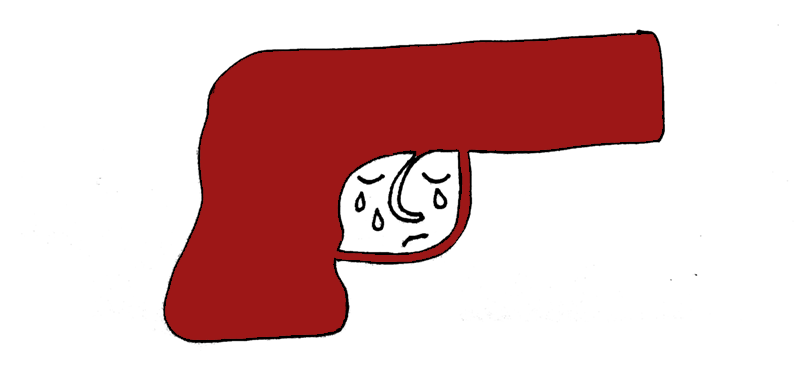Politicians, stop saying mass shootings are tragedies unless you’re going to do what literary critics do with tragedies: actually interpret them.
“This was a horrible tragedy:” perhaps the most common thing we hear after each new incident that adds to the alarming trend of mass shootings in the United States. Columbine, Aurora, Newtown, Umpqua, Las Vegas, and Parkland are only the most notable communities whose names have come to symbolize the phenomenon. Their “tragic” quality is the reason, some politicians say, we shouldn’t “politicize the tragedy” – we shouldn’t refer to it in arguments about policies for the good of the nation.
There is a very different response, however, to “tragedies” traditionally understood. We’ve been analyzing and arguing about the meanings and implications of Shakespearean tragedies for more than four centuries. The fictional nature of these literary tragedies lets us unpack them without feeling disrespectful toward those who died (since they were characters, not people). But I sometimes wonder what would happen if we treated literary tragedies with the same seriousness and respect we give to social tragedies, and what would happen to our public discourse if we approached social tragedies with the analytical fearlessness we give to classic works of literature.
When people say don’t politicize the tragedy, what they mean is don’t analyze the tragedy. Don’t attempt to make sense of it by considering its origin, structure, and implications. Don’t interpret it in the way we interpret literature. And when someone says this was a horrible tragedy, we need to hear I don’t want to consider why this happened.
This is the so-called “crisis in the humanities” playing out before our eyes, though of course the crisis isn’t in the humanities; it’s in the educational system that has devalued the humanities. But if we’re going to keep a straight face when we tell our children that great literature like Shakespeare’s plays is worthy of study in school, then we ourselves must be willing to use literature to think about life.
The fact that we’re becoming numb to reports of mass shootings, as President Obama lamented in his press conference after the Umpqua shooting, allows for the detachment that’s necessary for fearless analysis. And the immense interpretive tradition we’ve developed to discuss and explain Shakespearean tragedy can help us make sense of “tragedies” that happen in society.
Technically speaking, tragedy is a genre of literature, usually drama, and the mass shooting has become a genre of social experience. As President Obama noted after the Umpqua shooting, while indignantly vowing that he now would politicize these tragedies, “This has become routine.” There is a pattern of events and ideas: that’s what literary critics study when we look at the formal features of a text. Certain kinds of characters seem destined for certain kinds of plots. Certain kinds of imagery seem to appear over and over in the context of certain themes. Over time, patterns emerge. Certain things cluster together. These are the concerns of “formal” literary criticism, specifically “genre studies:” What is the generalizable “form” that spans the individual examples? What patterns of events and ideas occur? What is the structure and logic of the pattern? What is its meaning? Why does it exist?
What would a “genre criticism” of the mass shooting look like? What are the patterns? What are the clusters? What is the structure and logic?
We might note, for instance, that mass shootings often occur on university or high school campuses. Why is that? Probably because shooters are often young adults at once gaining independence (and the ability to acquire firearms) and lacking a mature understanding of themselves and the world (that’s why they’re in school). It probably also relates to what school represents – knowledge and understanding that the shooter himself lacks. And it probably involves the symbol of the school as a place of tranquility – contemplation and conversation that can be disrupted by violence and action.
Marlowe’s Dr. Faustus and Shakespeare’s Hamlet were both students at the University of Wittenberg. The severity of their tragedies is connected to their contemplative personalities, which they happen to share with those of us who enjoy and study such works of literature. Identifying with the protagonist in a tragedy is always problematic because it leads to the question, would I have done the same had I been in those circumstances? Would I open fire on a classroom of my peers if I had a mental illness that didn’t allow me to process information and emotions rationally, if years of counseling hadn’t helped, if decades of frustration had culminated in more pain than I could handle, if I felt as if no one understood me, if I saw on television that those who committed mass shootings were receiving tons of attention, if I thought that attention was worth the ultimate price, and if the means of enacting such horrific violence were easily accessible? That’s not an ethical question about what I should do – the answer to that question is easy: don’t do it! It’s an analytical question about what is possible and what is probable in those circumstances, given those social situations and personal limitations.
What would I have done? is a terrifying question because it reveals the power of the situation over the individual. Oedipus, Hamlet, Faustus, Willy Loman, and Okonkwo are romanticized as “tragic heroes” because they are noble, talented, and strong individuals brought down by circumstance. The whole point of tragedy is that sometimes circumstances can develop such that good, decent, well-intentioned, even heroic men and women can make slight miscalculations out of weakness or ignorance that result in a catastrophe with a scope and severity that is disproportionate to the mistake that was made.
It is significant that the shooting at Umpqua happened in the shooter’s writing course, just as it is significant that he was also enrolled in a drama course and was an aspiring filmmaker. Likewise, it is significant that the killing of two reporters in Virginia happened on live television and that the shooting in Aurora happened in a movie theatre. Mass shootings are written in advance – planned, plotted, staged, and acted in an effort to communicate a certain narrative – as symbolized by the notebook the Aurora shooter sent to his therapist, the box of materials the Umpqua shooter gave to one of the people he let live, and the call the Orlando shooter made to a television producer. Like terrorism, mass shootings are self-consciously theatrical. Like the tragic protagonist, the mass shooter is obsessed with having his story told: the shooter giving someone his narrative is, effectively, Hamlet saying to Horatio, at the end of Shakespeare’s play, “Draw thy breath in pain to tell my story.” At the same time, the mass shooter’s note explaining “why this happened” is a version of the tragic hero’s soliloquy expressing his pain and suffering. The same is true for the terrorist, as when one of the Boston Marathon bombers was compelled to “shed some light on [his] actions” by scrawling out their meaning on the side of a boat where he was hiding from police.
As the Marathon bombing illustrates – as the incidents in San Bernardino and Orlando also illustrate – there is often a devout fundamentalist theology at work in the protagonist or perpetrator of tragedy. Both Doctor Faustus and Prince Hamlet are devout Christians whose actions follow from a sense that the theological systems in which they have invested so much have failed to achieve reality. The fundamentalist then acts as if it is his right, if not his obligation, to assume the power he identifies with God and exploit that power in an effort to achieve the system of truth and justice that God and society have failed to achieve. “O cursed spite,” Hamlet says, “That ever I was born to set it right.”
There are many more eerie similarities between mass shootings in the U.S. and tragedies like those written by Shakespeare. Both show how an individual’s pain and suffering can transform into a bloody catastrophe with mass casualties. Both often involve madness. Both tend to involve the death of the victims and the perpetrators alike. Both involve a hamartia, a Greek word sometimes translated as “fatal flaw” but better rendered as “error,” “mistake,” “miscalculation,” “missing the mark,” or even “weakness.” In other words, tragedy can usually be traced back to a character’s ill-conceived moral choice, but often that choice occurs in a context of limited knowledge, and sometimes tragedy flows from an imperfection in a character that does not stem from any conscious moral decision. Consider King Lear, whose idiotic decision to split up his state seems to have occurred in conjunction with an onset senility that damaged his ability to think clearly. Here hamartia is more of a weakness or a shortcoming than a flaw or mistake, and this version of hamartia seems to be what is at work today. Most mass shooters display some sort of mental illness, an imperfection or shortcoming which, if not treated, can impair their mental and moral decision making processes, often through no fault of their own. The easy view of the perpetrators of mass violence is to see them as deranged humans who make radically evil choices that result in catastrophe; the more nuanced view – the one adopted by most serious literary critics – is to view tragic protagonists as only part of an equation that involves social forces far beyond their knowledge or control.
Tragedies only arise when the individual shortcomings of a person who wields great power operate in conjunction with aggravating cultural factors. Shakespeare was especially obsessed with the cultural origins of catastrophe. “Something is rotten in the state of Denmark” in Hamlet. Macbeth’s ambition leads him to kill King Duncan, but Macbeth’s ambition was (1) operating in the context of a mind mangled by a traumatic wartime experience, and (2) prompted by the Weird Sisters, who emerge from and vanish into the primordial ooze of Scotland. The effect is to suggest that Macbeth’s individual failings grow out of Scotland’s cultural failings. Likewise, the obvious moral lapses in a young mass shooter’s decision to open fire on others grow out of the culture to which he belongs.
Ill-conceived habits and beliefs institutionally codified at the level of government can create a situation where an individual’s moral failures create out-sized pain, suffering, death, and the downfall of nations. That is the thesis of all of Shakespeare’s tragedies. Take away the corrupt government and you take away the tragedy. The problem is not the individual, who exhibits failures that have been around since the dawn of time and will be around till the dusk. The problem is the government which amplifies the mistakes individuals make.
Where Renaissance tragedy and the modern mass shooting seem to stand apart, however, is in the extent to which guilt infects an entire society. The trope in Renaissance tragedy is that an injustice occurs that goes unpunished (usually a family member is murdered or raped); the family of the person who suffered this injustice sees that society is incapable of administering justice, so that person must suspend civil law, take justice into his own hands, and take revenge against the guilty even if it means that he will become a criminal himself. “I can’t stand to see such evil go unpunished,” one of the Boston Marathon bombers wrote of the US government’s actions toward Muslims. There is not an exact equation between the failed criminal justice system that starts a tragedy like Antigone or Hamlet and the failed political system that facilitates mass gun violence in the U.S. But almost everyone dies at the end of a revenge tragedy because – so the logic goes – almost everyone is guilty of something: the original offender is guilty of the initial crime, the revenger is guilty of crime in the name of vigilante justice, and the innocent bystanders are guilty of belonging to a society that could not administer justice.
That’s not fair, of course: innocent people are by definition not guilty. But the argument of revenge tragedy is that innocent people will die when society doesn’t successfully administer justice. Because guilt on one level (the cultural level) manifests as guilt on another level (the individual level), tragedy forces us to consider how much of the blame to attribute to the individual perpetrator of mass violence and how much to attribute to a society that creates the conditions for mass violence. If we take the analogy between Renaissance tragedy and modern mass shootings seriously, it becomes necessary to see the hamartia that sparks it as a cultural failing to deal with the problem of gun control. From this perspective, the very specific criminal guilt of the mass shooter (the choice to break the law, to cause harm, to fire a gun at another person) is a function of the very general moral guilt of the American people (the failure to pass gun control legislation and to vote against people who won’t do so). The individual’s criminal guilt would not exist without the culture’s moral guilt. Denial of this causal chain only stems from a refusal to analyze the tragedies.
Classical tragedy was always about nobles – kings, queens, emperors, the rich and famous – because it sought to address powerful people’s actions. Arthur Miller showed in the 1950s that there could be a tragedy of the common man but, in a way, mass shootings still take us back to classical tragedy. Firearms give people enormous power over others. Like classical tragedies, mass shootings show the catastrophes possible when everyday human imperfection arises in those who have amassed enormous power.
If guns make people powerful, it is certainly true, as King Claudius says, that “madness in great ones must not unwatched go.” But mass shootings are not a mental health issue. Mental illness has been around forever. It’s not going anywhere. Widespread ownership of guns is a relatively new phenomenon. If our plan is to keep our guns and get rid of mental illness, we’re going to fail. But gun control does seem to be a challenge within our grasp. If you take the power of guns out of the equation – if unstable people don’t have access to guns – you take away the possibility of tragedy.
I felt, after Donald Trump’s election, that it was evidence of the decline in the humanities that scholars have been warning of for more than a decade now. I also feel, however, that the response from the Parkland students – who have been not only mature and articulate but (more importantly) insightful, intelligent, productive, and effective, often drawing upon their education to interpret the situation and strategize their response – is evidence of the impact of our fight to save the humanities.
The value of the humanities is that they train us to ask the big questions that easily get covered over when we turn to the minutia of policy debate. Why do many Americans love guns? Do we need them? Why was the second amendment written? What does it mean? What are the effects – positive and negative – of widespread gun ownership in America? Why do politicians oppose gun control legislation? What would our policy on guns be if we could start from scratch? These are the first-order questions that have been silenced by a conversation focused on bump stocks and background checks. They are also the kind of question that young people – smack dab in the middle of their broad-based education – are better prepared to ask and answer than adults mired in the day-to-day hustle of family and career. This is why the rise of high school voices politicizing their tragedy in the immediate aftermath of the Parkland shooting is inspiring.
Where does the American obsession with guns come from? Surely from the fact that we fought with guns to secure our independence as a nation. The story of our power as a people is inextricably linked with the violent war we had to fight to establish our nation. Our love of guns is a byproduct of America’s yearning for power. The NRA has successfully convinced a subset of American culture that guns symbolize freedom, and gun ownership therefore equates to patriotism. Since the American Revolution, we have been transitioning from a warrior culture to a civil society, much like the states in a great number of Shakespearean tragedies – Hamlet, Macbeth, Othello, Julius Caesar, Coriolanus, Titus Andronicus. Like them, we have resuscitated the violence of war in our policies and politics. Soldiers become presidents. Foreign wars become civil wars. Physical battles become wars of words. And caught up in the middle of it are individuals who didn’t create this situation but are created by it.
Tragedy does not involve a battle between good and evil. It involves fraught cultural history leading to imperfect people in charge of imperfect government institutions enforcing imperfect policies and playing politics like it’s a game; swept up in the middle of this mess, the protagonist fights as best he can to do the right thing, but then some slight miscalculation – usually made not out of malice but out of ignorance – starts a chain reaction which grows bigger and bigger the longer it goes on, enveloping others in the story, until the world simply cannot bear the weight of the tragedy, and it all comes crashing down in death and the end of nations.
If we are serious about calling mass shootings “tragedies” – not in the shallow sense of “a horrible event with much blood shed,” but in the meaningful sense, as represented in literature, of “a catastrophe brought about through individual mistakes made by powerful people whose faulty processing of pain and suffering is multiplied into mass casualty by bad government” – then we must reckon with the social critique made by all tragedy. The surface reading of tragedy tries to affix all moral blame to the individual criminal; the deeper reading recognizes that there is blame to go around.
Shakespeare was obsessed with contextualizing the immediate cause of catastrophe with the root causes. Shakespearean tragedy shows that individual actions have cultural origins. By the same token, America’s mass shooting problem will require a cultural solution. To be clear, I am not advocating for a solution here. I’m stating a fact: mass shootings will continue in America until enough people die that the pity and fear we feel in response to tragedy transform into activism effective enough to create the cultural momentum needed to elect the politicians needed to pass gun control laws strict enough to significantly reduce the number of guns in the country. That’s not a wish; it’s not a plea. That’s just how this plays out.
That’s the point of the first few lines of Shakespeare’s Romeo and Juliet, where Verona sounds a lot like the United States Congress:
Two households, both alike in dignity,
In fair Verona, where we lay our scene,
From ancient grudge break to new mutiny,
Where civil blood makes civil hands unclean.
That last line can also be read in reverse: unclean civil hands make civil blood. By the end of the play, Romeo and Juliet are both dead and “with their death bury their parents’ strife.” Most tragedies end with a glimmer of hope in the restoration of social order. I’m sure our time will come, but how many more Americans will have to die for Republicans and Democrats to bury their strife? •
All images by Isabella Akhtarshenas.












